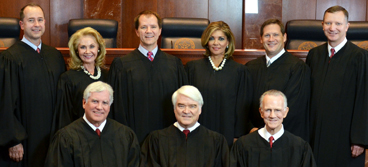© 2016 The Texas Lawbook.
AUSTIN (Nov. 30) – An appeals court’s use of Wikipedia to define the term “welfare queen” is under review by the Texas Supreme Court in a closely watched libel case.
Media groups and a law professor are urging the court to be cautious in embracing online sources, particularly an open-source website like Wikipedia. The online “encyclopedia” allows users to make and edit entries, which may heighten the potential for inaccurate and biased information.
“Courts should not avoid the Internet, but their online fact research should be guided by established procedures and principles,” said Layne Keele, associate professor of law at Faulkner University in Montgomery, Ala.

The litigation arose from a 2013 article in D Magazine entitled “The Park Cities Welfare Queen.” Written by an anonymous author, the piece discussed a woman’s receipt of food stamps while living in her fiancé’s million-dollar home. After the article ran, the state agency that administers the nutrition program investigated and found no evidence that Janay Bender Rosenthal had fraudulently obtained benefits.
In addition to her libel claims, Rosenthal sued the magazine for deceptive trade practices and identity theft for allegedly using information obtained by a person pretending to be Rosenthal. The magazine moved to dismiss the lawsuit under the Texas Citizens Participation Act, a 2011 law that allows early dismissal of a lawsuit if the plaintiff cannot establish a prima-facie case by clear and convincing evidence.
The trial court refused to dismiss the defamation claim against the publication but did throw out the other allegations.
The Dallas-based 5th Court of Appeals in August 2015 affirmed the trial court, holding that Rosenthal made a sufficient case to support her claim that the magazine had negligently accused her of welfare fraud.
The appeals court noted that because the article had a “Crime” label and used the term “welfare queen,” a reasonable reader would conclude that Rosenthal submitted false information on her benefits application. In a footnote, the court citied Wikipedia as the source for defining “welfare queen” as a woman who has defrauded the welfare system by using false information to obtain benefits or as a woman who has exploited the system by having children out of wedlock.
During arguments before the Supreme Court in October, the magazine’s attorney said the Dallas Court of Appeals inappropriately conducted its own research using Wikipedia.
“Here, neither party submitted the Wikipedia entry or any definition of ‘welfare queen’ or even contended that ‘welfare queen’ had any particular relevance to the gist of the article,” said Jason Bloom, a Dallas partner at Haynes and Boone.
Chief Justice Nathan Hecht remarked that courts commonly consult dictionaries to define words.
Yes, Bloom said, but there is a difference in looking up a statutory term as opposed to an “amorphous” term like welfare queen. And, he added, Wikipedia may be “perfectly good for resolving disputes around the dinner table, but is a terrible source for resolving judicial disputes.”
Rosenthal’s attorney, John DeFeo, used his time to discuss facts he said the magazine omitted: a lengthy custody battle that left Rosenthal’s funds depleted; a stalker who obtained her Social Security number; and Rosenthal’s regular use of her parents’ address as her mailing address.
‘Satirical Critique’
DeFeo disputed contentions raised by a dissenting justice on the appeals court panel who said the article was a “satirical critique” of the food stamp program and that Rosenthal had not established that the gist of the article was false. If the article had been mainly about the system, DeFeo said, then D Magazine would have done a follow-up reporting the state agency’s conclusion that the benefits were legal.
“Defamation in this day and age of the internet is something that lives with you the rest of your life,” said DeFeo.
The Texas Press Association, Texas Association of Broadcasters and other media groups filed a brief supporting the magazine. The organizations said Texas courts and counsel need guidance on the use of unverified, collaborative websites like Wikipedia.
“When courts derogate from their duty to conduct a rigorous, textual analysis of a publication and choose to rely instead on user-generated Internet content to determine ‘meaning,’ free speech suffers,” said Thomas Leatherbury and Marc Fuller of Vinson & Elkins in a brief for the media organizations.
“If plaintiffs are allowed to litigate issues of falsity, privilege, and state of mind based on any ‘meaning’ that might possibly be supported by any online, user-generated content, libel litigation will become more common and more costly – and a chilling effect will ensue.”
